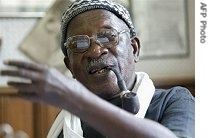2007年VOA标准英语-Senegalese Filmmaker Ousmane Sembene Mourned in(在线收听)
Dakar
11 June 2007
Senegalese filmmaker Ousmane Sembene is being buried in Dakar as praise is being showered from across the world on his career. Selah Hennessy reports from Dakar his death at the age of 84 also leaves a void, revealing how little success there is in Africa's withering film industry.
 |
| Ousmane Sembene (2005 file) |
He said most often his ideas come simply from meeting ordinary people, and listening to them. He said what is more important is constructing a good story from beginning to end.
Sembene often compared himself to traditional African storytellers, who record memories of daily lives and events, and through their stories can cement societies.
The New York Times, one amongst many African and international media outlets to pay tribute to the artist, says Sembene was a "crucial figure in Africa's postcolonial cultural awakening."
"He was the first one to treat Africa as something real, as a territory belonging to Africans, telling African stories," said Jean Roy, a French film critic.
Roy says that with Sembene's death, Africa has lost its cinematic father.
"Sembene was certainly the most important African film maker from a historical point of view," he said. "He was the founder of African cinema."
"Ousmane Sembene is our father, he is the father of African cinema," said Adams Sie, a young Senegalese film maker. "We love his work, we inspired a lot from him. He is a legend."
He says that Sembene has died at a time when Senegalese cinema is doing very badly.
"Senegalese cinema is dying, dying very badly," he said. "Because there is no cinema where we can project our films and the media, the television, they do not want to show the films we are making here."
He says there is a lot of cinematic creativity in Senegal now, but little money and no infrastructure.
"We do not have any network to hold us together, everyone is working independently," he said. "We have to work together and do things in common for our own interest."
The film maker also wrote novels, including the widely-acclaimed God's Bits of Wood, which told the story of a strike staged by railway workers during the 1940s.